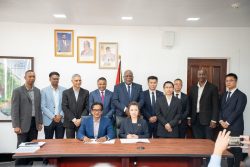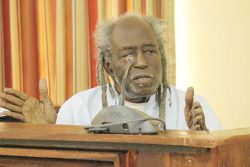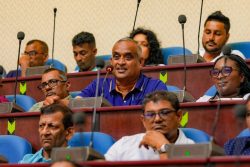 Less than a generation ago, not unlike our Venezuelan neighbours who are now scattering all over the world due to the political fallout in their country, Guyanese were leaving by legal or illegal means, trying to get to somewhere to make a decent living for themselves and their families. To this day, notwithstanding all the promises of great wealth from oil Guyanese migration has not ceased and this history has gone into making Guyanese quite understanding and tolerant of economic and political migration. However, the present influx of Venezuelans, Guyana’s recent discovery oil and gas, which is likely to attract other foreigners, its relatively liberal citizenship rules, and the electoral numbers game (the recent quarrel in the press between the government and the opposition about the method and numbers of foreigners who are being made citizens SN: 14/04/2019) that our politicians are playing have raised concerns that the interest of the native population is likely to be submerged.
Less than a generation ago, not unlike our Venezuelan neighbours who are now scattering all over the world due to the political fallout in their country, Guyanese were leaving by legal or illegal means, trying to get to somewhere to make a decent living for themselves and their families. To this day, notwithstanding all the promises of great wealth from oil Guyanese migration has not ceased and this history has gone into making Guyanese quite understanding and tolerant of economic and political migration. However, the present influx of Venezuelans, Guyana’s recent discovery oil and gas, which is likely to attract other foreigners, its relatively liberal citizenship rules, and the electoral numbers game (the recent quarrel in the press between the government and the opposition about the method and numbers of foreigners who are being made citizens SN: 14/04/2019) that our politicians are playing have raised concerns that the interest of the native population is likely to be submerged.
It is our duty to treat migrants and all those who come to these shores in a humane and responsible manner. Where migration is concerned, we should provide migrants with all the help we can, and in collaboration with global partners, attempt to find solutions to the underlying causes of their exodus. However, no government, particularly of a small country with a population of 786,000, should allow migration or labour needs to fundamentally negatively affect the well-being of its people. Guyanese have been encouraged to believe that the good life beckons and the policies of other governments, particularly those of the relatively small and resource-rich countries in the Arab world, are suggestive of an approach.
Take the example of the United Arab Emirates (UAE), which has had to deal with similar fears that its standard of living and national identity could be severely compromised by foreigners outnumbering the native population. The UAE has a population of 9.3 million people with a per capita income of US$67,700 within its 32,300 sq miles, 7.8 million or 90% of which are expatriates. The country’s proven natural gas reserves exceed 25 trillion cubic meters, which at 13%, is the world’s third largest reserve. Its oil reserves exceed 25 billion barrels and at present levels production can continue for 56 years. Emirati citizens have visa-free or visa on arrival access to 167 countries, ranking its passport first in the world in terms of travel freedom (The Passport Index).
Citizens of the UEA have an impressive array of benefits. First class healthcare is free to all and when not available locally, the government pays for advanced treatment abroad that includes the cost of an accompanying family member. Among other things, education is also free to secondary level and the government again provides scholarships for bright students for overseas universities, including covering their cost of living. There are various housing grants and free land, and if enlisted in one of the housing programmes, a free home is provided. The Marriage Fund gives generous grants to cover the cost of weddings and there is a child allowance. The cost of both electricity and water consumption are heavily subsidised and of negligible cost. Emiratis get preferential treatment for public sector and some private sector jobs and generally are paid higher than expatriates. As we have seen, the Emirati passport is highly regarded, and interestingly, any foreigner who wants to start a business needs to have a UAE citizen as at least a 51% partner even if the latter makes no financial input. As a result, some Emiratis charge a sponsorship fee for simply lending their name to a business (https://www.quora.com/What-are-the-perks-of-being-a-UAE-citizen).
The amount of benefits a country is able to give to each citizen is heavily dependent upon the size of the citizenry and UAE citizenship is extremely difficult to acquire. For example, UAE nationality is granted to foreigners only if they fulfill one of the following conditions: is an Arab with ancestral origins in Bahrain, Oman or Qatar who has been legally settled in the UAE for at least 3 years; is an Arab who has been legally settled in the UAE for at least 7 years; is a person with Arabic proficiency who has been legally settled in the United Arab Emirates since 1940; is a person with Arabic proficiency who has been legally settled in the UAE for no less than 30 years with at least 20 years since 1972. All applicants must have maintained a good reputation, have a legal source of income and not have been convicted of a crime. The right to vote or be a member of parliament is limited to Emirati citizens by descent and dual citizenship is prohibited. A foreign female married to an Emirati male may acquire citizenship if the marriage has lasted for at least 7 years and there is a child or 10 years if there are no children. Until recently, a child born to an Emirati mother and a foreign father had to apply for citizenship after s/he reached 18 but the law has now been changed to allow citizenship after the age of 6.
In relation to the UAE, Guyana has a fairly liberal citizenship regime that allows citizenship by birth, descent, naturalization or marriage. Thus, children born to Guyanese citizens are entitled to citizenship and a child born outside Guyana may be granted citizenship if either parent is a citizen of Guyana. People married to Guyanese citizens are eligible for citizenship if they apply and take the prescribed oath of allegiance. Naturalization requires that an applicant must have resided in Guyana for 5 out of the last 7 preceding years and for 12 months immediately before making the application. Dual citizenship is recognized but dual citizens are not allowed to sit in parliament. (https://www.refworld.org/docid/492ac7c9c.html).
Bearing in mind Guyana’s national and international commitments, the people of Guyana should have the right to determine what level of benefits they require in what time frame and the nature of the citizenship regime that will, if necessary, be established to protect them. By way of the United Nations Sustainable Development Goals Guyana has already committed to establish basic social security guarantees that should ensure that all Guyanese have access to essential health care and to a basic income to secure effective access to goods and services.
In relation to citizenship, by virtue of the Treaty of Chaguaramas, Guyana has a commitment to establish a Caribbean Community with a single market and economy which includes a community citizenry, passport and the free movement of people, which it will have to navigate. Furthermore, in 2008, Guyana became a member of the Union of South American Nations (UNASUR) with objectives that include ‘The consolidation of a South American identity through the progressive recognition of the rights of nationals of a Member State resident in any of the other Member States, with the aim of attaining a South American citizenship.’ And later in the same year, in the context of UNASUR and no doubt with self-interest in mind, Venezuela agreed to regularize 50,000 illegal Guyanese residents who may now have dual Guyanese and Venezuelan citizenship (KN: 20/07/2008).
For a country with a small population a laissez-faire approach to the issue of citizenship and benefits is unacceptable: particularly since some politicians and their supporters may see increasing citizenship as useful for the long run survival of their party. Unlike the UAE, Guyana is not a monarchy and to help and protect them against political vicissitudes all of our commitments and benefit arrangements need to be urgently designed and put to the Guyanese people at some kind of a referendum.









